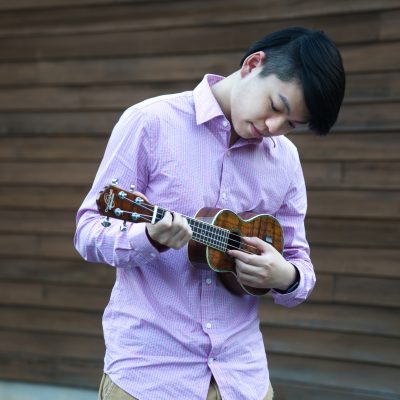Student Spotlight: Yongjian Tang

February 21, 2022
Yongjian Tang is a doctoral candidate in physics from Guangdong, China. After attending Hong Kong University of Science and Technology as an undergraduate, he chose to pursue further study at Cornell due to the physics faculty, facilities, and collaborative atmosphere. Yongjian Tang is a recipient of a 2022 Wu Scholarship.
What is your area of research and why is it important?
I’m doing experimental research in condensed matter physics. To be more specific, I study the symmetry and interplay of ferric orders in a group of materials called multiferroics that exhibit (anti)ferroelectricity and (anti)ferromagnetism simultaneously. The quest for materials with a strong coupling of electric and magnetic properties has never stopped. Understanding how to design and synthesize multiferroics with desired attributes, what methodology should be developed in order to characterize these order parameters, in what way they are coupled, and whether we can manipulate the coupling is very interesting in fundamental physics research and semiconductor industry.
What are the larger implications of this research and what is its impact?
One potential product this research can lead to is novel electronic nanodevices with extremely high energy efficiency and durability. Nowadays, nanotechnology is widely used in electronic equipment such as cell phones and computers, etc. Considering the ever-increasing energy consumption by humans, these novel devices can help reduce the energy waste and relieve the excessive exploitation of natural resources.
What does it mean to you to have received the Hsien and Daisy Yen Wu Scholarship?
I’m very honored to receive the Hsien and Daisy Yen Wu Scholarship. This is a huge recognition for my work. It strengthens my motivation for achieving my research goal and it helps me believe in my personal growth as an experimental physicist.
What will this award allow you to do that you might not have been able to otherwise?
I have been attending scientific meetings over the past years. Presenting my work to people conducting research in the same field and people in the industry is an essential part of my academic career in that it can exchange ideas and facilitate collaborations. This scholarship allows me to attend even more conferences and workshops without worrying too much about finances.
What are your hobbies or interests outside of your research or scholarship?
Outside of my research, I enjoy all kinds of ball sports such as tennis, soccer, badminton, you name it. These games are good not only for burning calories but also for making friends. Also, as suggested by my picture, I am an amateur musician who is still perfecting his piano skills. I learned skiing as a beginner right here in upstate New York. I do enjoy the fast speed when skiing down a steep trail.
Why did you choose Cornell to pursue your degree?
I chose to pursue my Ph.D. degree at Cornell simply because it’s one of the best. I was drawn to the department’s outstanding faculty members, state-of-the-art facilities for condensed matter experiments, and its close ties with the industry. Cornell has such a supportive and collaborative atmosphere that makes doing research here really enjoyable.
